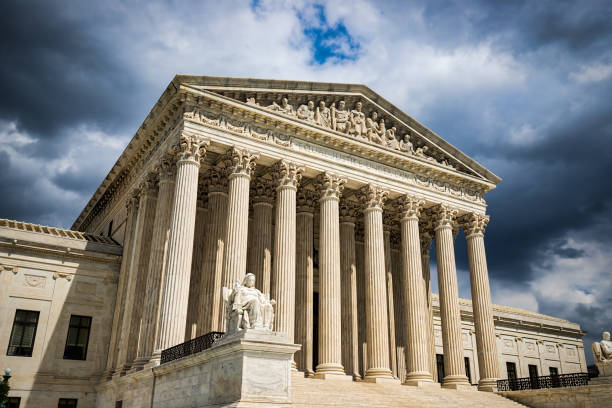By Mariam Rasooli

On June 24, 2022, the United States Supreme Court issued a landmark decision in Dobbs v. Jackson Women’s Health Organization, holding that the Constitution does not confer a right to abortion.[1] This ruling effectively overturned the earlier decisions in Roe v. Wade and Planned Parenthood of Southeastern Pennsylvania v. Casey—which had prohibited states from substantially preventing abortions for women before fetal viability.[2] Soon after the Dobbs decision was released, abortion bans began to take effect in a number of states—with some already having laws in place to automatically “trigger” abortion bans in the event that Roe was overturned.[3] Currently, most abortions are banned in Idaho, South Dakota, Wisconsin, Indiana, Kentucky, Tennessee, Missouri, Arkansas, Mississippi, Alabama, Louisiana, Texas, and Oklahoma.[4] Georgia has also instituted a ban on abortions at about six weeks of pregnancy.[5]
In light of the Dobbs decision, state prosecutors throughout the country have publicly pledged not to press charges against abortion providers and individuals that seek them. 84 elected prosecutors, who represent a combined 87 million Americans across their respective jurisdictions, have signed onto the joint statement released by Fair and Just Prosecution.[6] Significantly, the signatories include prosecutors from states such as Alabama and Louisiana—which have since banned abortions.
Although such public statements are well-meaning and arguably brave, many question whether these pledges will have any significant or practical effect on abortion rights. It should be noted, as a baseline, that prosecutors have always exercised discretion in the cases they decide to pursue. Prosecutors can decide to drop charges, like speeding slightly above the limit, in the absence of a plea bargain. This prosecutorial discretion has been used in the past to reflect a stance on controversial issues. For example, many prosecutors declined to bring sodomy cases—despite state laws—in the years before the Supreme Court decided Lawrence v. Texas in 2003.[7]
The use of this discretion makes sense when one is reminded that prosecutors are elected by the constituents they represent, to serve their jurisdiction under the agenda they campaigned on. It’s entirely common for there to be pockets of communities that vote on the opposite end of the state’s majority political leaning. Prosecutors of these communities can choose to use their power in a way that represents their constituents.
The question remains, however, whether a prosecutor’s use of such discretion will really ensure access to abortion in their jurisdiction. Experts are dubious, citing the facts that some states allow the government to simply hand cases to a different prosecutor and that state attorneys general can also have the power to bring cases on their own.[8] These powers place a significant limitation on the impact that prosecutorial discretion can have in these states. Developments in this area will have widespread implications beyond abortion access, displaying the practical capabilities of prosecutorial discretion.
[1]Dobbs v. Jackson Women’s Health Org., 142 S. Ct. 2228, 2234 (2022).
[2] Roe v. Wade, 410 U.S. 113, 114, (1973); Planned Parenthood of Southeastern Pennsylvania v. Casey, 505 U.S. 833, 834 (1992).
[3] Veronica Stracqualursi & Tierney Sneed, Abortions to be Put Further Out of Reach for Millions of Women as Slate of ‘Trigger Bans’ Take Effect, CNN: Politics (Aug. 25, 2022), https://www.cnn.com/2022/08/25/politics/abortion-access-trigger-laws-idaho-tennessee-texas/index.html.
[4] Tracking the States Where Abortion is Now Banned, New York Times (Sept. 15, 2022), https://www.nytimes.com/interactive/2022/us/abortion-laws-roe-v-wade.html.
[5] Id.
[6] Joseph Gedeon, Blue-City Prosecutors in Red States Vow Not to Press Charges Over Abortions, Politico (June 26, 2022), https://www.politico.com/news/2022/06/26/blue-city-prosecutors-in-red-states-vow-not-to-press-charges-over-abortions-00042415.
[7] David A. Graham, Local Prosecutors Can’t Protect Abortion Rights, The Atlantic, (July 14, 2022), https://www.theatlantic.com/newsletters/archive/2022/07/local-prosecutors-cant-protect-abortion-rights/670529/; Lawrence v. Texas, 539 U.S. 558, 558 (2003) (holding that state statutes making it a crime for same sex persons to engage in sexual conduct is unconstitutional).
[8] David A. Graham, Local Prosecutors Can’t Protect Abortion Rights, The Atlantic, (July 14, 2022), https://www.theatlantic.com/newsletters/archive/2022/07/local-prosecutors-cant-protect-abortion-rights/670529/.

